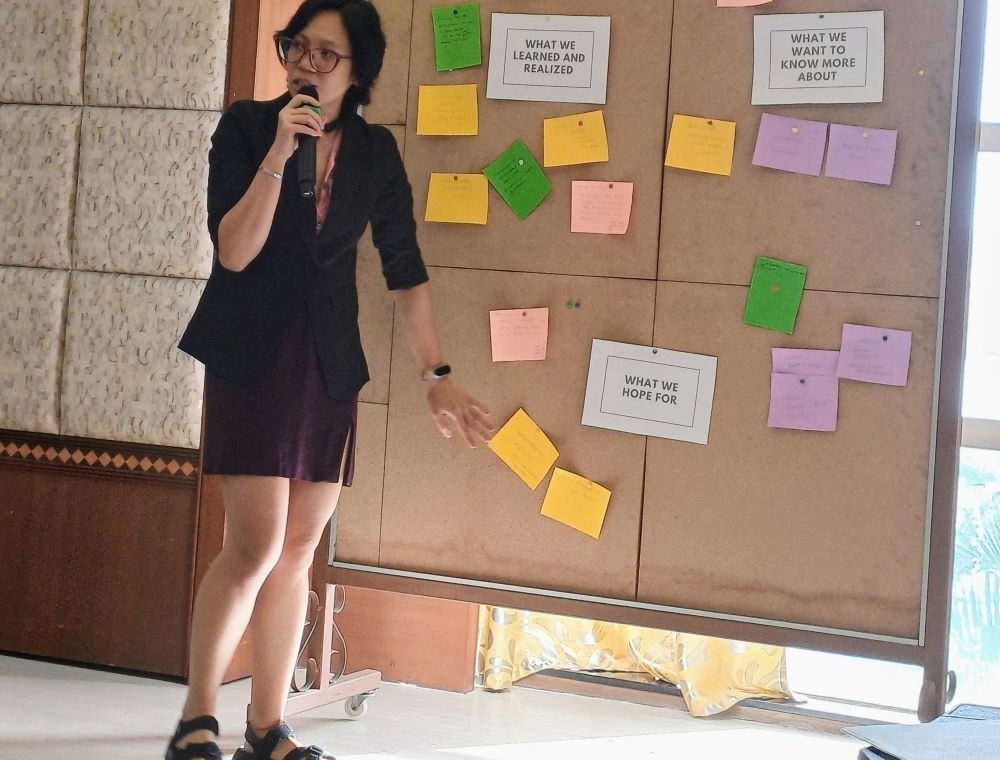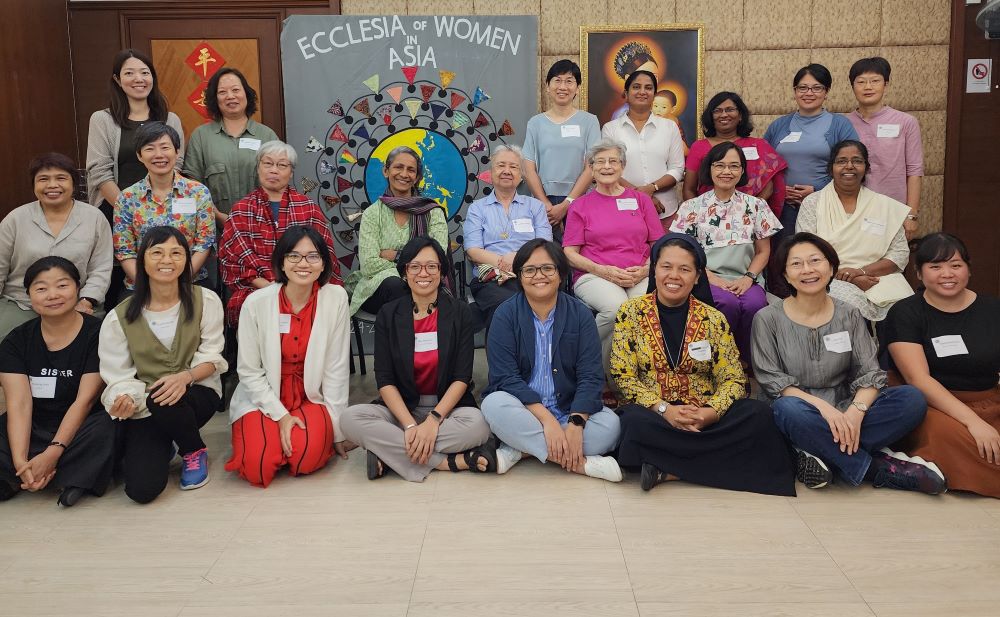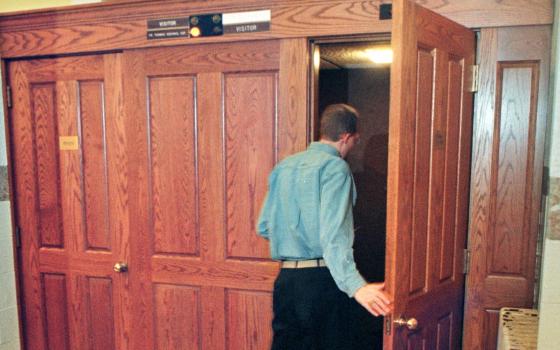
Rachel Joyce Sanchez, former coordinator of Ecclesia of Women in Asia, speaks at the Ecclesia of Women in Asia XI conference, held in Macau, China, in 2024. (Courtesy of Ecclesia of Women in Asia)
Stephanie Ann Puen is a theologian from the Philippines and the coordinator of the Ecclesia of Women in Asia. The organization recently participated in an international conference in Rome titled "The Future of Theology: Legacy and Imagination."
Puen is a professor in the department of theology at Ateneo de Manila University. She spoke with Global Sisters Report about the Ecclesia of Women in Asia organization and its goals.
GSR: In my search for Catholic feminist theologians, I discovered Ecclesia of Women in Asia and your name as a contact. I was thrilled because I have known a number of feminist theologians, primarily sisters, in recent years but had no idea there was such an organization. I am eager to hear about Ecclesia of Women in Asia and what it does. I was also excited to know that there are Catholic sisters in the group.
Puen: In 2002, 55 Asian women theologians, lay women and Catholic sisters gathered in Bangkok to meet and discuss how we might raise our voices to build a more inclusive Catholic Church for women in Asia. At the end of our time together, we decided to organize ourselves into a group, Ecclesia of Women of Asia. We wanted to be inclusive, not just of academic theologians but pastoral workers who also do theology in practice. We thought we had something to offer the church and as a group, wanted our voices and experiences to be heard, not marginalized or kept silent.
How did you choose the name for the conference and when was your last one?
We meet every two years and our last conference was this past year 2024, in Macau, with around nine women religious and 15 lay women onsite, and around five lay women and four religious joining us online. It was our first hybrid meeting with participants in person and online. Our theme was "Ecclesia of Women as Synodal Third Space."
What did you mean by "third space?"
The third space is an "in-between space" where perspectives from the marginalized and unheard can be cultivated and listened to, part of the movement toward becoming a more synodal church. Such a space offers a foundation for elaborating on and negotiating self-identity, along with points of collaboration and challenge to society and the church.
Ecclesia of Women in Asia has been going for 22 years already, do you feel your organization is bringing Asian voices out of the silence?
Our group is still small, but having a hybrid format will help to make it more available to many more. It is a challenge to get our voices out there, but we are definitely part of the current debates in the church about how women's voices and leadership are marginalized.
We have made some progress in the last few years as a church and that helps all women. The appointment of Sr. Raffaella Petrini as the first female [president of the Pontifical Commission for Vatican City State and president of the Governorate of Vatican City State] was an important addition. Then most recently, Sr. Simona Brambilla, as prefect of the Dicastery for Consecrated Life. These are all steps, but having females in these settings still raises eyebrows and resistance.
Franciscan Sr. of the Eucharist Raffaella Petrini, president of the office governing Vatican City State, with her predecessor, Cardinal Fernando Vérgez Alzaga, inaugurate a nursery school for children of Vatican employees at the Vatican April 14. (CNS/Vatican Media)
So, where have you seen progress in Asia through Ecclesia of Women in Asia efforts?
Well, not as much as we would hope. Even though we are still doing most of the groundwork in our churches — labor for parishes, dioceses, in schools and hospitals, and we still feel we are second-class citizens in the church. Our voices are still dismissed as not important, and usually unheard when we do speak and of course abuse is still present on many levels. It can be discouraging.
Many of us hoped that being educated in ecclesiastical or civil theological degrees women would more likely be invited into leadership positions, but there are still many obstacles in both of these paths. Opportunities are very few to make these kinds of degrees financially viable in certain countries. Besides financial issues, sisters face other issues. They get a basic degree in theology, or maybe a master's degree, and are immediately put into pastoral or administrative work in their own communities. Not many are encouraged to take Ph.Ds. A lot of theological talent is left undeveloped and the church loses a lot too.
I don't know how to get superiors to value theology study as important and think more broadly about the needs of the wider church. We need those women's voices in theology development.
We all still face intractable patriarchal structures — priests or bishops are first to be considered for leadership positions, even when not necessary. Most discouraging is that even among lay people, a male priest is thought to be "more holy" than a woman religious or lay woman, hence why they are picked to teach in seminaries or universities, over women religious or lay women who may also have Ph.Ds.

The participants of the Ecclesia of Women in Asia XI conference, held in Macau, China, in 2024 (Courtesy of Ecclesia of Women in Asia)
So, what is the plan for Ecclesia of Women in Asia's future?
Right now, as I said, we meet every two years. We choose a theme and have speakers make presentations and encourage exchange of ideas. These gatherings also give space to nourish our shared faith and we make sure they are intergenerational. We encourage emerging theology scholars doing doctorates or professional pastoral workers to articulate for us the theologies that animate their work. It is quite energizing.
We go back to our countries feeling supported and with new ideas and perspectives to share with others. We also go back with stronger commitment to uplift women's voices and support all women in their work for the church.
I recall on your website that you also publish the materials from your conferences. How are they available to others?
We want our voices out there, so yes, we partner with publishing houses and journals to produce our work on many different topics: sexuality, marriage, cyber ethics, power, food, displacement and migration. We also produced materials on the impact of COVID-19. A new edited volume coming out soon is on Asian women, the church and synodality. This was the theme of this last conference in Macau.
Advertisement
The synod was important for the whole church. How would you say that it impacted your conference?
Women in Asia are mostly from countries where Catholics are a minority, even regarded suspiciously sometimes, especially with the rise of extreme nationalism, polarization and authoritarianism. Now, more than ever, three dialogues are needed: with other religions, with other cultures and with the poor. And all these dialogues include the tensions around gender roles, usually because of cultural beliefs. These are just assumed, learned and upheld in the various Asian cultures. We just cannot assume any more that Catholicism is the default religion, culture or worldview. Our diverse Asian perspectives have something important to offer the whole church.
What do you hope for Ecclesia of Women in Asia in 2025?
There are a few things. One is that Catholic feminist nuns become more involved in our efforts, even if they are not strictly theologians and that their superiors will encourage their involvement in theology.
Another is to find ways to help support women religious financially so that they can come more often and participate in EWA — many are unable to come to our conferences because of the lack of funding. While EWA raises funds, it also is not able to fund everyone fully, which hampers the participation of many women religious who do not have the funds to fly to our conferences. Having a hybrid format has helped in this regard, but having face-to-face interactions still is different and often very lifegiving for the participants, compared to being online.
Lastly, we hope to bring in more emerging women scholars and pastoral or professional workers into our conferences to help mentor them for the future. While our conference might seem more like it is geared toward just academically inclined women theology, we invite all women scholars and women who work in pastoral or professional fields and are interested in theology and its relationship to their work. We would be happy to learn from them as well as help them further refine their work in theology, towards creating a more inclusive and just church.





